Related Research Articles

Chinua Achebe was a Nigerian novelist, poet, and critic who is regarded as a central figure of modern African literature. His first novel and magnum opus, Things Fall Apart (1958), occupies a pivotal place in African literature and remains the most widely studied, translated, and read African novel. Along with Things Fall Apart, his No Longer at Ease (1960) and Arrow of God (1964) complete the "African Trilogy". Later novels include A Man of the People (1966) and Anthills of the Savannah (1987). In the West, Achebe is often referred to as the "father of African literature", although he vigorously rejected the characterization.
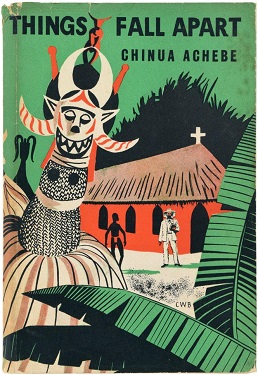
Things Fall Apart is the debut novel by Nigerian author Chinua Achebe, first published in 1958. It depicts pre-colonial life in the southeastern part of Nigeria and the invasion by Europeans during the late 19th century. It is seen as the archetypal modern African novel in English, and one of the first to receive global critical acclaim. It is a staple book in schools throughout Africa and is widely read and studied in English-speaking countries around the world. The novel was first published in the United Kingdom in 1962 by William Heinemann Ltd, and became the first work published in Heinemann's African Writers Series.
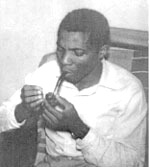
Christopher Ifekandu Okigbo was a Nigerian poet, teacher, and librarian, who died fighting for the independence of Biafra. He is today widely acknowledged as an outstanding postcolonial English-language African poet and one of the major modernist writers of the 20th century.
In June 1962 a conference of African literature in the English language, the first African Writers Conference, was held at Makerere University College in Kampala, Uganda. Officially called a "Conference of African Writers of English Expression", it was sponsored by the Congress for Cultural Freedom and the Mbari Club in association with the Department of Extra-Mural Studies of Makerere, whose director was Gerald Moore.
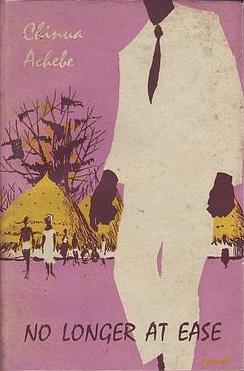
No Longer at Ease is a 1960 novel by Nigerian author Chinua Achebe. It is the story of an Igbo man, Obi Okonkwo, who leaves his village for an education in Britain and then a job in the Nigerian colonial civil service, but is conflicted between his African culture and Western lifestyle and ends up taking a bribe. The novel is the second work in what is sometimes referred to as the "African trilogy", following Things Fall Apart and preceding Arrow of God, though Arrow of God chronologically precedes it in the chronology of the trilogy. Things Fall Apart concerns the struggle of Obi Okonkwo's grandfather Okonkwo against the changes brought by the British.
The African Writers Series (AWS) is a collection of books written by African novelists, poets and politicians. Published by Heinemann, 359 books appeared in the series between 1962 and 2003.
Ogidi is an Igbo speaking town and the headquarters of Idemili North Local Government area, Anambra State, Nigeria. It has an estimated population of 70,000 people and share boundaries with neighbouring towns like Abatete, Ṅkpọr, Ụmụnnachị, Ụmụoji, Ogbụnike and Ụmụdiọka.
Mbaise is a region in Imo State in southeastern Nigeria. In the heart of Igboland, the region includes several towns and cities. It is a group of indigenous clans, connected by intermarriage. With a population density of over 1,000 people per square kilometer, Mbaise is West Africa's most densely-populated area; its 2006 population was 611,204.
Ada Udechukwulisten is a Nigerian artist and poet associated with the Nsukka group.

Vincent Chukwuemeka Ike OFR, NNOM was a Nigerian monarch, academic and writer known for a mixture of lampoon, humour and satire. He owed a little bit of his style to his Igbo cultural upbringing. He studied history, English and Religious Studies at the University of Ibadan and earned a master's degree at Stanford University. Among many of the first generation of Nigerian writers, he was popular as the author of Expo '77, a critical look at academic examination abuses in West Africa. Ike was a former registrar of the West African Examinations Council (WAEC).
Civil Peace is a 1971 short story by Chinua Achebe. It is about the effects of the Nigerian Civil War (1967–1970) on the people and the "civil peace" that followed.
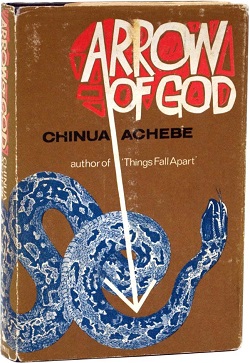
Arrow of God, published in 1964, is the third novel by Chinua Achebe. Along with Things Fall Apart and No Longer at Ease, it is considered part of The African Trilogy, sharing similar settings and themes. The novel centres on Ezeulu, the chief priest of several Igbo villages in colonial Nigeria, who confronts colonial powers and Christian missionaries in the 1920s. The novel was published as part of the influential Heinemann African Writers Series.
A Man of the People" (1966) is a novel by Nigerian writer Chinua Achebe. Written as a satirical piece, "A Man of the People" follows the story told by Odili, a young and educated narrator, about his conflict with Chief Nanga, his former teacher who enters a career in politics in an unnamed fictional 20th-century African country. Odili represents the changing younger generation, while Nanga represents the traditional West African customs inspired by Achebe's native Nigeria. The book ends with a military coup, similar to the real-life coup organized by Major Chukwuma Kaduna Nzeogwu, Major Adewale Ademoyega, Major Emmanuel Ifeajuna, Captain Chris Anuforo, Major Donatus Okafor, and Major Humphrey Chukwuka.
Vengeful Creditor is a short story by Chinua Achebe. It was first published in 1972 in Girls at War and Other Stories. The story describes a wealthy woman who has recently lost her servants due to free education. The book intends to illustrate the social gaps in Nigeria between the lower, middle, and upper classes.

The Thing Around Your Neck is a short-story collection by Nigerian author Chimamanda Ngozi Adichie, first published in April 2009 by Fourth Estate in the UK and by Knopf in the US. It received many positive reviews, including: "She makes storytelling seem as easy as birdsong" ; "Stunning. Like all fine storytellers, she leaves us wanting more".

Government College Umuahia, or GCU, is an independent secondary school for boys located on Umuahia-Ikot Ekpene road in Umuahia, Nigeria.
Echezonachukwu Chinedu Nduka is a Nigerian poet, author, pianist, recording artist, and musicologist specializing in piano music by West African composers. His work has been featured on BBC, Radio Nacional Clasica de Argentina, Radio France International (rfi), and Classical Journey.

Oseloka Henry Obaze (OHO) (born 9 April 1955 in Ogidi, Nigeria) is a native of Ochuche Umuodu in Anambra State, Nigeria. He is a Nigerian diplomat, politician, author and a retired United Nations official who served the organization as an international civil servant between 1991 and 2012. Prior to working at the United Nations, he worked as a career Foreign Service Officer (FSO) in the Nigerian Diplomatic Service from 1982-1991. Following his retirement from the United Nations, Oseloka H. Obaze served as Secretary to the State Government of Anambra State, Nigeria from June, 2012 till June, 2015 under former Governor Peter Obi and former Governor Willie Obiano.
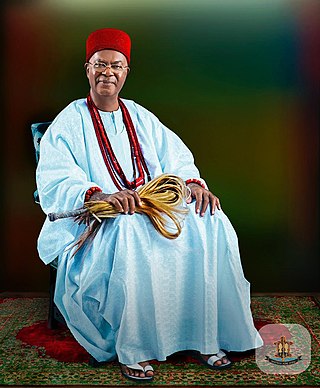
Nnaemeka Alfred AchebeCFR, mni is a traditional ruler and the 21st Obi of Onitsha, in Anambra State, South-Eastern Nigeria. He is chancellor of Ahmadu Bello University since 2015, and was earlier chancellor of Kogi State University. Achebe also serves as the chairman of the board of Directors of Unilever Nigeria, and the Chairman of International Breweries (ABInBev) Nigeria. Before emerging as the Obi of Onitsha, in 2002, he had a long and distinguished career in the Royal Dutch Shell Group serving as Director in various companies in the group.
Ezenwa-Ohaeto was a Nigerian poet, short story writer and academic. He was one of the first Nigerians to publish poems written in pidgin English. He died in Cambridge in 2005.
References
- ↑ Achebe, Chinua. Dead Men's Path. Literature: A Pocket Anthology. Fourth Edition. Edited by R. S. Gwynn. New York: Penguin, 2009.
- ↑ "Prose: Dead Men's Path By Chinua Achebe". The Book Banque. Retrieved 2020-08-05.
- ↑ Richter, Juliane (2015-11-27). Forward Across Graves. Chinua Achebe's "Dead Men's Path" as an Example for a Cultural Clash (in German). GRIN Verlag. ISBN 978-3-668-09723-0.
- ↑ Gaunce, Julia; Mayr, Suzette; LePan, Don; Mather, Marjorie; Miller, Bryanne (2012-07-25). The Broadview Anthology of Short Fiction - Second Edition. Broadview Press. ISBN 978-1-55481-076-5.
- ↑ Gioia, Dana (2006). The Art of the Short Story. Pearson Longman. pp. 10–12. ISBN 0-321-33722-0.